'DE&I is a business challenge. It’s a necessity.'
Smart organizations don’t embrace diversity and inclusion programs just because it’s a nice thing to do. As global technology company SAP is finding, it’s about transforming the workforce to perform at its very best.
For Diversity, Equity and Inclusion (DE&I) leader Margot Goodson, embedding strong diversity practices in the workforce isn’t about the feel-good factor. It’s about creating better outcomes, both for people and the bottom line.
DE&I has become a critical issue, driving important conversations around the world. And it’s in the workplace—where organizations have the power to take immediate action—that the impact can be most felt.
At organizations such as SAP, where Goodson is VP and Head of Diversity and Inclusion, North America, strong DE&I practices are no longer optional. She argues that it's not enough to just offer ‘training’; DE&I must become a core component of an organization’s cultural DNA.
“The myriad of reasons for inclusivity and the benefits it brings to the workplace culture and business outcomes are so exponential, just understanding them is part of it, because sometimes people see DE&I as a moral challenge—and it’s not, it’s a business challenge. People see it as a ‘nice thing to do’ and it’s not—it’s a necessity,” Goodson says.
SAP, a global leader in enterprise application software, employs more than 100,000 people of 150 nationalities, encompassing myriad differences in culture, ethnicity, gender, sexual orientation, and physical ability.
Although SAP had made progress in DE&I, Goodson cites key benefits in its decision to take it further: “By embedding diversity and inclusion into their DNA, companies can experience benefits including increased employee engagement, higher productivity and innovation, better customer satisfaction, and stronger financial results,” she says.
SAP first worked with Deloitte’s Human Capital practice two years ago to help develop its DE&I initiatives. The two companies were already connected through their global alliance delivering technology solutions to clients, and SAP had been impressed with Deloitte’s track record of implementing DE&I change at scale in its own workforce.
Some SAP leaders, including Goodson, had previously attended sessions featuring Deloitte’s proprietary DE&I methodology, the Six Signature Traits of Inclusive Leadership. Goodson’s team launched a major program to deliver a customized version to more than 900 members of SAP’s senior management team in North America (USA and Canada).
Deloitte’s project lead, Charles Phillips, a U.S. managing director in Consulting, Human Capital, says the Six Traits (see sidebar) have demonstrable value. “Getting these traits right is the key, and as an inclusive leader, your workplace will be more connected, you’ll bring your authentic self to work, and you’ll optimize your role, setting an example for your people and your clients” he says.
All ‘6Cs’, which are delivered through workshop sessions, are vital pieces in the diversity solution. But Goodson felt two of them were most salient: “The biggest ones were around Cultural Intelligence and Cognizance. They are about what we say and do, and the impact that has is very important.”
These were the key objectives for participants:
- Understand Deloitte’s Six Signature Traits of Inclusive Leadership
- Grow in awareness of non-inclusive behaviors and language
- Identify practical tips for supporting the SAP workforce
- Commit to practicing the Six Signature Traits on an ongoing basis

Deloitte’s Six Signature Traits of Inclusive Leadership
Cognizance
Because recognizing bias is fundamental for any DE&I initiative to succeed.
Cultural Intelligence
Because not everyone sees the world through the same cultural frame.
Curiosity
Because different ideas and experiences enable growth.
Collaboration
Because a diverse-thinking team is greater than the sum of its parts.
Courage
Because talking about imperfections involves personal risk-taking.
Commitment
Because staying the course is hard.
“This was not an ‘event’. This was an enablement opportunity for the SAP managers to have a breakout moment, a moment that matters for their career”
- Charles Phillips, Deloitte U.S. Consulting Managing Director
Measuring impact
Key to success in DE&I initiatives is effecting meaningful behavioral change. To measure the project’s impact, Deloitte custom built a baseline 36-question survey in advance of the workshops.
To keep participants engaged, the survey took less than five minutes. To eliminate non-committal, mid-range answers, a four-point Likert scale was used instead of the usual five. The team also refined the survey to eliminate false positives. The result was a mine of data on each participant’s inclusivity mindset.
As with so much in the past year, COVID-19 disrupted initial plans, and the team had to quickly re-engineer the in-person workshop environment for a virtual audience. Deloitte addressed how to facilitate collaboration, drive engagement, maximize soft-skills transfer, and draw out personal stories to enrich the online workshop experience.
The team believes this project is the largest of its kind in North America. It has delivered 86 sessions to 43 cohorts of 25-plus participants over a 13-week schedule, enabling more than 950 SAP and Concur leaders.
Participants enjoyed it: The net promoter score for overall session satisfaction was over 94 percent. The pre- and post-session surveys revealed a 7-point aggregate increase in people’s ability to demonstrate the Six Traits. The participants also baked inclusivity goals into individual action plans for future leadership development.
“If you really embrace [the workshop learning] and let it enable your day to day practices, it will increase leadership trust scores, it can increase employee engagement scores, and it can increase the percentage of colleagues that embrace diversity—because what you demonstrate as a leader in exemplifying behaviors can make your team stronger,” Goodson says.
SAP knows that its people are still navigating the DE&I path. But the road ahead is well lit. The project generated more than 60 leader DE&I commitments to inspire sustained action and activation, including some from the most senior people in the business.
The increasing value of DE&I to workforce transformation means more organizations are adopting the Six Signature Traits. Phillips says: “My prediction is, we’ll be doing more of this work because it’s addressing the needs of our broader community, it connects humans and, right now, inclusivity is happening.”

"By embedding diversity and inclusion into their DNA, companies can experience increased employee engagement, higher productivity and innovation, better customer satisfaction, and stronger financial results."
— Margot Goodson, SAP